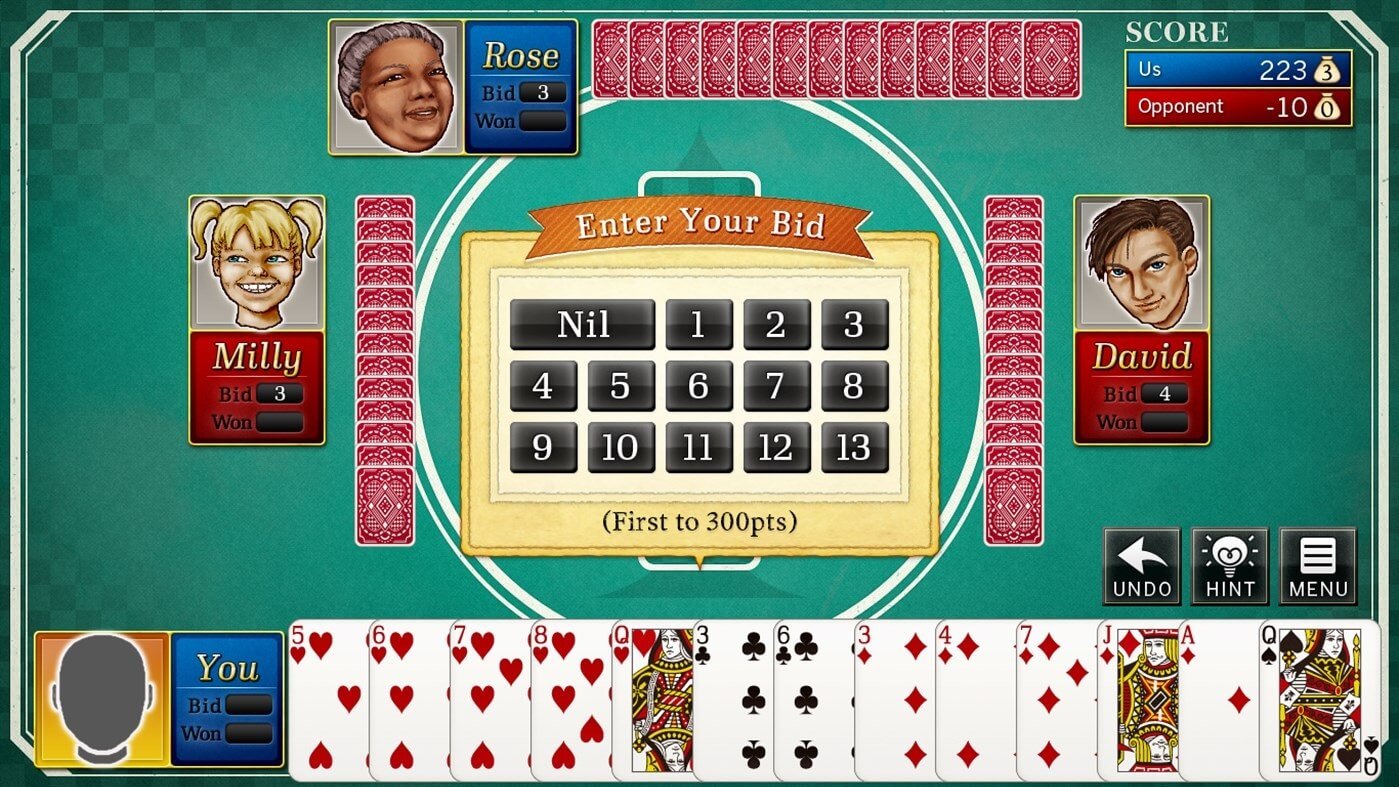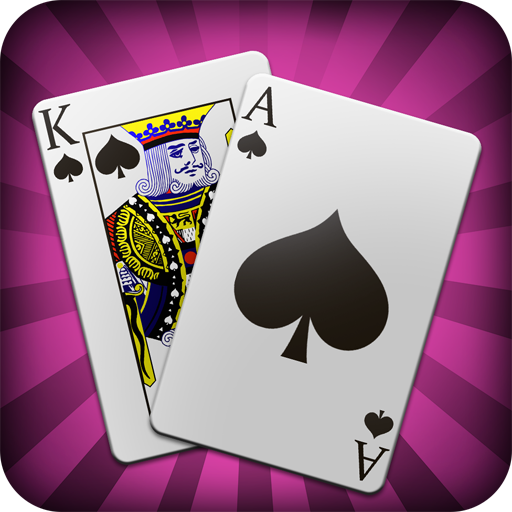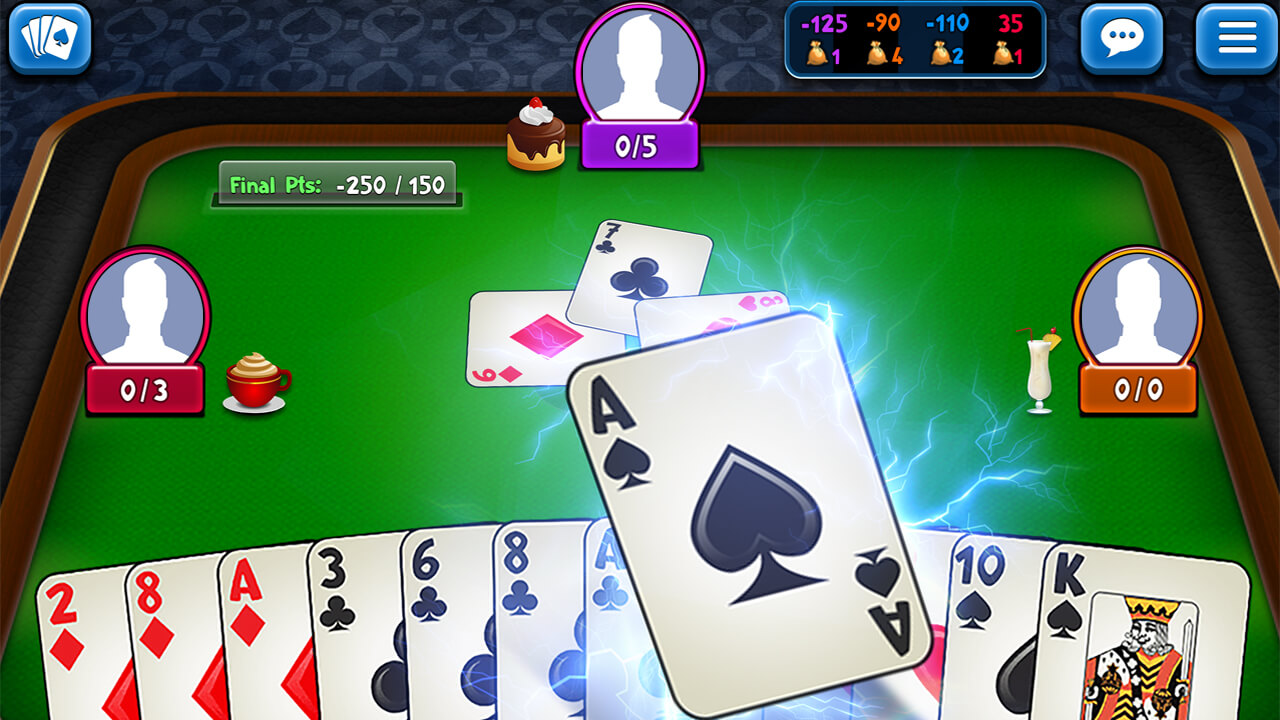

When playing Spades it is important to always remember your partner. For Blind Nil, these values are doubles (200 points). You can opt to bid nothing which (Nil bid), if successful, will reap your team extra 100 points. Not all Spades games use bags, but ours does. This isn't a bad thing per se, but if you gather 10 bags you will deducted 100 points. Bags, or tricks won in excess of the contract, count as one point each. Tricks count ten points each for a partnership if the contract is made, and ten against if it is set. This is true of both games ending at a point value and timed games. In the case of a tie for first, the game will continue until there is a clear winner. The game does not allow ties for first place. If you play a Spade and no one else does, you win the trick. If you are out of the lead suit, you can play any card you like. Now for the tricky part and the reason the game is calls Spades. The highest card in that suit wins the trick. Play begins with the player to the dealer's left leading a card. Your bid and your partners are then added together and this is the number of tricks your team must take. To start you must estimate how many tricks you think you can take with your hand. Each player plays one card and together they are called a trick. The game begins with all cards being dealt. If a player bids Nil, (meaning they expect to win no tricks), then they may, depending on the rule settings, be allowed to exchange up to four cards with their partner once everyone else has bid.

The sum of partnership bids are called the contract. Starting with the dealer, each player in turn bids the number of tricks she expects to win. The hand is sorted by suit, then rank: Clubs, Diamonds, Spades, Hearts. The layoutĮach player is dealt a hand of 13 cards from a 52 card deck. The object of this game is to be the first team to reach 300 or 500 points. Players sitting across from each other are partners on the same team. Spades is a trick-based card game for 4 players. In general, the goal of each Hand of Spades is to predict or Bid on how many Tricks you will take during that hand. It is a partnership card game that, like Bridge, is descended from the old English game of Whist. Whether you consider yourself to be an expert or you’re just looking to enjoy a quick game, our collection of free card games is the place to be, no card shuffling, 52-card pickup, or removing jokers required.Spades is a trick-taking card game devised in the United States in the 1930s and became popular in the 1940s. Once a deck of cards is ready to be retired (in Las Vegas a deck of cards is used for no more than 12 hours before being retired and taken out of circulation) the casino will either punch a whole through the cards or cut off a corner to also help prevent cheating. It also doesn't hurt that plastic playing cards last longer than their paper counterparts. Most casinos around the world use plastic playing cards not for cost savings purposes, but rather to prevent cheating given that they are much more difficult to crease than paper-based playing cards.

We didn't spend the time calculating this, but according to credible resources there are actually more ways to shuffle a standard 52 deck of cards than there are atoms that make up the planet.

All other suits contain 4 cards per deck. The joker, on the other hand, is a much more modern American invention and is the only card suit with two cards. Modern cards originated in France in the late 1400's, when images of men and women were first introduced, along with the suits that are still used today: spades, hearts, diamonds and clubs.After poker Rummy -which is exceedingly popular in India- is considered to be the 2nd most popular card game. In fact, it has become so popular in the US that some consider it to be a sport and not a card game. It is widely believed that poker is the world's most popular card game.Our extensive collection of free online card games spans 10 classic free solitaire titles, as well as several other best in class card games including 2 classic versions ofĭid you know that playing cards were first invented in China around the 9th century AD (they more closely resembled dominoes than today’s paper cards), spread to India and Persia, and were later introduced in Europe in the 14th century? In fact, we’re the card game experts, having created the Microsoft Solitaire Collection that comes pre-installed on every single computer with Microsoft Windows. Here at Arkadium, we know a thing or two about card games.


 0 kommentar(er)
0 kommentar(er)
